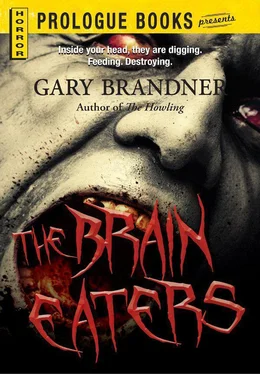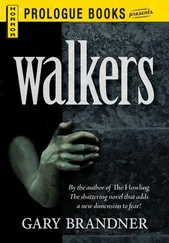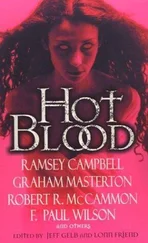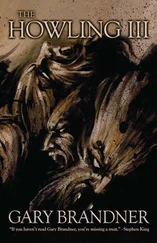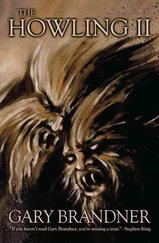Corey soon tired of the pointless bustle at the pool headquarters. He understood now Doc Ingersoll’s reluctance to come down. On his way out he got on a telephone and dialed Doc’s number.
He heard the burr of the phone ringing on the other end, but there was no answer. After ten rings Corey hung up and left the building feeling vaguely uneasy. Maybe the phone wasn’t working properly. He decided to drive over and see if he could change Doc’s mind about tying one on.
• • •
The ringing of the telephone was like a red-hot knife blade stabbing through Doc’s head. He clapped both hands over his ears and stood hunched over the bathroom sink, whimpering until the ringing finally stopped. The pain continued. He looked up at his reflection in the streaked mirror.
Corey had been right. He didn’t look good. It had taken immense effort not to show the terrible pain of his headache while Corey was there. He had swallowed a full bottle of a hundred aspirin tablets since that morning, but they had done no good. Nothing was going to do any good.
Doc had not let himself admit what he had until there was no longer the faintest hope he was wrong. Now he fancied he could hear the ugly little creatures chewing their way through his brain tissue, popping the blood vessels as they went, creating the unbearable pressure under his skull. He knew he could stand it no longer than a few more minutes; then he would go screaming into madness, lashing out at everything and everyone around him. His face would erupt in those festering boils and spew the seed of the diabolical parasite into the air.
He walked back to the bed and pulled open the drawer of the nightstand. Lying on top of a John D. MacDonald novel was a Smith & Wesson.38-caliber revolver. It was well oiled and loaded. Doc picked up the gun, jammed the muzzle against the roof of his mouth, gagging at the oily taste. He pulled the trigger.
All the way back through the littered streets to the Dorchester Apartments, Corey had a sense of foreboding, like a cold, moist hand clamped on the back of his neck. He repeatedly told himself to snap out of it, that there could be any number of reasons why Doc had not answered his telephone. But the cold grip would not loosen.
He left the Cutlass out in front of the building in a no-parking zone. Interesting, he thought, how insignificant our minor laws become in a time of mortal danger. He would have given a lot to know he would come back and find a cop ticketing his car, just as though it still mattered where anybody parked. He irritably pushed the thought away. The cops had other worries, and so did he.
The woman somewhere on the first floor was still sobbing. She seemed to have been frozen in her lament since the beginning of time.
As Corey topped the second flight of stairs, he detected another smell mixed with the stale cooking odor. It was the old Fourth of July smell of exploded gunpowder.
He quickened his step down the hallway and knocked at the door to Doc’s apartment. There was no response. In his heart Corey had not expected there would be one. He tried the door. It was unlocked. Somehow he had expected that, too.
Corey stepped inside. The gunpowder smell was sharpest in there, cutting through the memory of a thousand cigarettes. A layer of blue haze hung in the room at eye level.
Doc lay with the lower part of his body on the bed, the upper sprawled down to the floor. Beneath his head the rug was soaked with dark, drying blood.
Corey knelt beside his friend. He saw the revolver still gripped in Doc’s hand. He saw the beginning of the red welts on the old reporter’s sallow face. Welts that would now not erupt to blow out the eggs of the brain eaters.
He stood up quickly and walked into the bathroom. There he braced his hands on the edges of the porcelain sink and leaned his head over it while his stomach lurched. In a few seconds the churning in his gut eased, and Corey looked up into the mirror over the sink. What did Doc see in this glass, he wondered, before he ate the bullet? Corey looked into his own eyes and did not much like what he saw there.
“This is it, hotshot. The Big Story,” he told his warped reflection. “The one you’ve been waiting for. Now that you’ve got it, how do you like it?”
He turned away from the unanswering image in the glass and went back into the living room — bedroom. He walked over and eased Doc’s feet down off the bed and arranged them so he was lying on the floor. Making the corpse more comfortable. Doc would have laughed at that.
He spread a blanket over his friend and walked to the refrigerator. He popped the top of a can of Heileman’s and raised it in the direction of the body.
“So long, Doc,” he said. “Rest easy.”
He drained half the can of beer, set the rest down on the table, and walked out of the apartment. Downstairs the woman was still crying.
“I wish I could join you, lady,” Corey whispered, and continued out of the building.
On the street a teenager with a scraggly moustache was trying to break into the Cutlass.
“What the hell are you doing?” Corey yelled at him.
“Fuck you, old man.”
That was exactly what Corey needed. With an open-mouthed cry of pent-up rage, he started to run at the would-be car thief. The youth stared for a moment, then turned to flee. Corey caught him with a punishing tackle at the knees and brought him down hard on the pavement.
“Hey, don’t, mister …” the teenager protested.
But Corey could not stop. He rolled the boy over onto his back and drove his fist again and again into the frightened face. The boy’s nose broke, his teeth gave, he blubbered through the blood that filled his mouth.
With his fist drawn back for one more blow, Corey suddenly stopped. The black rage drained away, and he relaxed, unclenching his hand. He rose and walked back to the car, paying no attention to the whimpering boy, who still lay on the sidewalk. His thoughts were somber as he started the car and headed north, but the terrible anger was gone.
• • •
Dr. Kitzmiller leaned forward across the desk in his Spartan office adjacent to the laboratories. His cheeks were sunken, and there were purple shadows under his eyes. Fatigue lay heavy upon him, but his eyes blazed with the bright blue light of a Bunsen burner.
“I am tired of carrying on the pretense,” he told the man standing across the desk from him. “It takes time and energy that I should be giving to finding the antidote.”
“You’re exhausted,” the other man said. “You should get some sleep.”
“Who is the doctor here?” Kitzmiller asked with grim humor.
“I can tell by looking at you.”
“It is only because you are not accustomed to seeing me up close like this,” Kitzmiller said. “Usually with us it has been through a glass darkly.”
“The one-way mirror was a necessary device. It would have been awkward to explain my presence in the room.”
“Yes, awkward to say the least.”
“You really should try to sleep,” the man said again.
“There is no time. Even when I do lie down, there is no rest. I cannot forget what I have done. Do you know what they have called me in the press? ‘Father of the Brain Eaters.’ How would you like to live with that?”
“You’re getting too thin-skinned. The brain eaters were an accident.”
Kitzmiller half rose from his chair. “Ah, were they? Were they indeed an accident?”
“You know they were.”
“I know what we are telling the people. That the whole thing was the unfortunate result of an experimental pesticide that was unfortunately not properly disposed of. At best a half-truth. There is no comfort for me in it.”
Читать дальше
